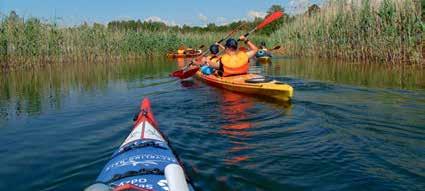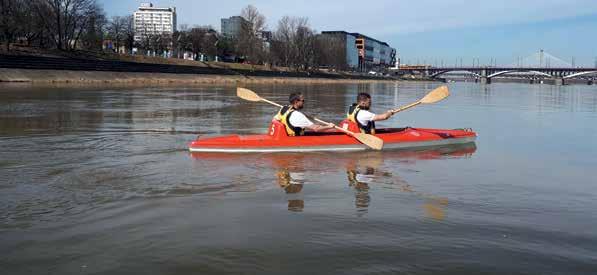
3 minute read
Fight against marine litter
Plastic litter in the marine environment is a global phenomenon, with final solution still remaining a distant prospect despite
numerous actions from all parties involved, including the industry. Causes, assessment of effects, and search for solutions have only been a matter of serious debate for about a decade. The need to reduce marine litter was expressed in EU legal provisions as one of
Advertisement
the elements of the circular economy, for example in the form of a requirement to reduce marine litter by 30% by 2030 and in the SUP Directive (see page 20). Discussion on the matter is also being conducted at a global level within the UNEP, which brings together representatives of countries from all around the world (United Nations Environmental Assembly, UNEA). The declaration summarizing the last UNEA meeting (March 11-15, 2019) states that the United Nations will engage in seeking solutions to environmental damage caused by the use of plastic products, and that their irresponsible disposal in the environment is in contradiction to the principles of sustainable development. Almost all (over 80%) plastic waste polluting marine environment comes from the land as a result of a lack of any effective waste
management system and inappropriate behavior by people, namely littering. Plastics are lightweight materials whose waste is carried away by wind or floats on the water surface; therefore they are more visible in the environment than other types of waste. At the same time, the plastics industry has drawn attention to the fact that plastics have a high value as a recyclable material, and for this reason, they should not end up in the environment at all. As part of dealing with environmental pollution, we promote selective waste collection which constitutes the basis for an increase in recycling and the return of these resources to circulation. The global plastics industry implements a voluntary Operation Clean Sweep ® program aimed at preventing the loss of plastic
pellets and their release into the environment. In Poland, the program is executed by two plastic-producing companies, Basell Orlen



Polyolefins and Synthos. PlasticsEurope Polska published the Polish language version of the supplementary materials detailing the implementation of the program (with guidelines and supporting documents to monitor the program’s execution by the company), and conducts a series of training courses for companies and their clients. Each year, PlasticsEurope, which supervises the execution of the OCS program in Europe, publishes a report on the subject matter, available at www.opcleansweep.eu. Supplementary documents and a declaration to join the program can be downloaded from the website as well. As part of the “Global Plastics Alliance”, plastics industry organizations all over the world have been involved in a number of programs aimed at reliably assessing the scale of plastic waste within marine litter and its actual impact on the ecosystem, as well as the promotion of appropriate environment-focused behavior. Every year, a report is published that summarizes the actions within this initiative (www.marinelittersolutions.com), which currently involves 75 organizations from 40 countries. The “Recykling Rejs – odzyskuj tworzywa sztuczne” [Recycling Rally – let’s recover plastics] action, organized by PlasticsEurope Polska and the traveler and environmental activist Dominik Dobrowolski, has an important place among the 355 informational and educational projects implemented within the Global Plastics Alliance with the aim of raising residents’ awareness of the need for proper waste management. In 2018, the eighth edition of the action took a completely different form: instead of a trip lasting several days, a series of short canoeing trips in various parts of Poland was organized, engaging local communities in cleaning up the banks of rivers and lakes. During these several-day-long events, including those on Nysa Łużycka, around Śniardwy Lake, on Parsęta in Kołobrzeg, and in Gołdap, the organizers carried out not only cleaning programs but also educational ones, holding meetings in schools and educational centers where children and young people, as well as other interested residents, had the opportunity to learn about the assumptions of the Recykling Rejs [Recycling Rally] project and the most important issues related to the prevention of marine litter.









